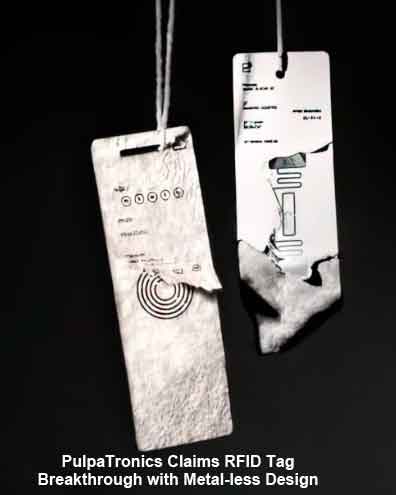Have student researchers in London come up with a break-through in metal-less RFID tags for retail and beyond?
Supply Chain Digest Says... |
 |
| PulpaTronics says the benefits are more than just environmental: its tag design, it claims, is twice as cheap to mass-produce as other RFID tags. |
 |
What do you say? |
| Click here to send us your comments |
 |
| Click here to see reader feedback |
| |
|
|
A company called PulpaTronics was founded by a group of four students at the Imperial College London’s Dyson School of Design Engineering.
The initial focus was on improving the sustainability of passive RFID tags, but they claim to have achieved a major cost breakthrough at the same time.
Today, passive RFID tags, which do not need a battery, are manufactured using a mixture of metal and circuitry to form the tag’s primary parts: a microchip attached to a small antenna.
The chip is energized by the power of the RFID reader and then communicates its information, whether that is a simple identification number or that plus additional data, such as weight or expiration date, as just a couple of many examples.
The chip and antenna are then embedded in a label or tag form factor. The cost to produce these RFID labels have continued to slowly decline over time, chasing the “5-cent tag” set up as a sort of tipping point needed for mass RFID adoption in the consumer goods to retail sector more than two decades ago.
The materials cost around $0.10 per tag, according to an estimate by the the International Association of Information Technology Asset Managers in 2021.
In addition to the quest for lower priced tags, today’s RFID is not environmentally friendly, with most tags headed fort the landfill after it they are used.
So along comes PulpaTronics, developing another version of so-called “chipless” RFID tags.
The company says that with its emerging technology, metal is completely from the manufacturing process. The geometric shape of the carbon layer somehow gives the RFID the needed conductivity and ability to transmit information to an RFID reader.
(See More Below)
|
CATEGORY SPONSOR: SOFTEON |
|
|
| |
|
|
PulpaTronics says on its web site that its all-paper RFID tags store information “geometrically,” using a laser to imprint a “conductive layer of carbon material” directly onto paper materials that can come from recycled paper, and then in turn be recycled after the end of its useful like.

But the benefits, PulpaTronics says the benefits are more than just environmental: its tag design, it claims, is twice as cheap to mass-produce as other RFID tags. That is because, it says, with fewer materials and components the manufacturing process can be reduced.
It looks like the company is early stage. The web site doesn’t have a lot of information and solicits visitors who are “Interested in what we're building” to fill out a simple inquiry form.
SCDigest will keep an eye on this one.
Any reaction to new RFID techology? Let us know your thoughts at the Feedback button below.
Your Comments/Feedback
|